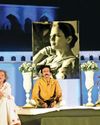In Parrikar’s absence, the fate of the BJP government in Goa may depend on the Lok Sabha election results

The year was 1994. For the first time, the BJP had won seats in the Goa assembly. Manohar Parrikar, 39, and three of his par-ty colleagues—Shripad Naik, Digambar Kamat and Narhar Haldankar—were elected.
The Congress, which had won 18 of 40 seats in the assembly, made its satrap Pratapsingh Rane chief minister. Parrikar told his colleagues that they had to launch an offensive against the Rane government in the first year itself. It was the surest way to create an impression in the minds of the voters, he said. He then identified four ministers who faced the most number of corruption charges, and launched a campaign against the “gang of four thieves”.
The campaign had double impact. First, it put the Rane government on the back-foot; second, Parrikar emerged as the leader of a party that was relatively new on Goan soil.
After that year, Parrikar never looked back. He went on to become opposition leader, chief minister and defence minister. His star kept rising and rising, till he succumbed to pancreatic cancer on March 17. He was 63.
Parrikar had been in and out of hospital since January last year, undergoing treatment in Goa, Mumbai, Delhi and the US. Despite his serious illness, he continued to be active as chief minister. Some say he did so because he wanted to die immersed in work, just like Bhausaheb Bandodkar had. The legendary Bandodkar, Goa’s first chief minister, had died in office in 1973.
Manohar Gopalkrishna Prabhu Parrikar was born in a traditional Gaud Saraswat Brahmin family at Parra village. His father, a simple man who led an austere life, had a grocery store in Mapusa. As a child, Parrikar started attending an RSS shakha so that he could play with a large group of boys. Subhash Welingkar, the former RSS chief in Goa who later fell out with Parrikar, often described him as ‘Bal Swayamsevak’.
Denne historien er fra March 31, 2019-utgaven av THE WEEK.
Start din 7-dagers gratis prøveperiode på Magzter GOLD for å få tilgang til tusenvis av utvalgte premiumhistorier og 9000+ magasiner og aviser.
Allerede abonnent ? Logg på
Denne historien er fra March 31, 2019-utgaven av THE WEEK.
Start din 7-dagers gratis prøveperiode på Magzter GOLD for å få tilgang til tusenvis av utvalgte premiumhistorier og 9000+ magasiner og aviser.
Allerede abonnent? Logg på

The female act
The 19th edition of the Qadir Ali Baig Theatre Festival was of the women and by the women

A SHOT OF ARCHER
An excerpt from the prologue of An Eye for an Eye

MASTER OF MAKE-BELIEVE
50 years. after his first book, Jeffrey*Archer refuses to put down his'felt-tip Pilot pen

Smart and sassy Passi
Pop culture works according to its own unpredictable, crazy logic. An unlikely, overnight celebrity has become the talk of India. Everyone, especially on social media, is discussing, dissing, hissing and mimicking just one person—Shalini Passi.

Energy transition and AI are reshaping shipping
PORTS AND ALLIED infrastructure development are at the heart of India's ambitions to become a maritime heavyweight.

MADE FOR EACH OTHER
Trump’s preferred transactional approach to foreign policy meshes well with Modi’s bent towards strategic autonomy

DOOM AND GLOOM
Democrats’ message came across as vague, preachy and hopelessly removed from reality. And voters believed Trump’s depiction of illegal immigrants as a source of their economic woes

WOES TO WOWS
The fundamental reason behind Trump’s success was his ability to convert average Americans’ feelings of grievance into votes for him

POWER HOUSE
Trump International Hotel was the only place outside the White House where Trump ever dined during his four years as president

DON 2.0
Trump returns to presidency stronger than before, but just as unpredictable